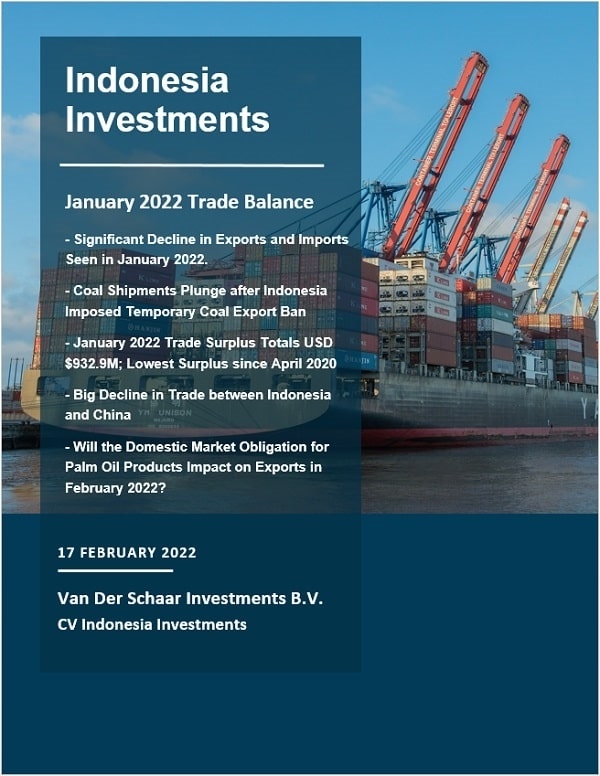Trade Balance of Indonesia: Significant Declines in Exports and Imports at the Start of 2022
Last month when we discussed the impressive December 2021 trade performance of Indonesia (when its exports remained strong at near-record high territory, while imports soared to a record high), we ended our article with several ‘things’ to watch:
(1) Russia-West tensions over Ukraine;
(2) To what extent Indonesia’s temporary coal export ban in January 2022 is to disrupt the country’s exports;
(3) To what extent were Indonesia’s November-December 2021 imports lifted by (seasonal) Christmas and New Year celebrations? Will there occur a significant decline in imports of consumer goods and raw materials at the start of 2022?
(4) Developments related to the spread of Omicron. While the situation seems to be under control (as Omicron is less dangerous than previous COVID-19 variants, hence leading to fewer hospitalizations and deaths), the real question is how governments are going to respond.
It is interesting to start this article with those four topics because there have, indeed, been some significant developments. The only exception is point (1) since tensions persist (with various countries retracting their ambassadors from the Ukraine) but the situation has not escalated into violent actions (yet). So, we simply need to wait for further developments. It is assumed that – if – Russia invades Ukraine it can lead to heavily rising international commodity prices amid uncertainty, especially when the United States (US) and European Union (EU) decide to impose tough sanctions on commodity-rich Russia. However, the question is whether Russia has actual plans to invade Ukraine.
While developments in the Ukraine are still to unfold, the other three points above show concrete developments.
The temporary coal export ban that the Indonesian government imposed in January 2022 (in an effort to safeguard coal supplies for the domestic market) indeed turned out to have a big impact on Indonesia’s export performance as the latest data show a USD $2.00 billion decline in mineral fuel exports (the category that includes coal) in January 2022 compared to December 2021. Mineral fuel exports plunged by 61.8 percent month-on-month (m/m) to USD $1.24 billion. And so, this short-lived ban certainly seems to have had a big impact.
Meanwhile, regarding point (3), we saw a (near) USD $2.0 billion decline in non-oil and gas imports into Indonesia in the first month of 2022, with imports of consumer goods declining 36.6 percent (m/m), and imports of raw materials and capital goods falling by double-digits, too. This certainly gives the impression that the recent peak in imports (in fact: a record high) was particularly supported by the holiday period (Christmas and New Year). But, we also assume that imports remain quite elevated overall as the economic rebound from the COVID-19 crisis is still ongoing.
Lastly, point (4), the Indonesian government decided to tighten social and business restrictions (or PPKM) in early February 2022 (implying it did not affect the January 2022 data, but can certainly impact Indonesian trade in February 2022) due to the rapidly growing wave of confirmed Omicron cases. It is a decision that surprised us as the bed occupancy rates in Indonesian hospitals seemed at a safe level, while it is agreed upon in the international discourse that Omicron is a much milder version of COVID-19, hence leading to relatively few hospitalizations and deaths. Moreover, it is also assumed that Omicron is so contagious that simple restrictions (for example: ‘50 percent work-from-home’ policies) will not have any effect. So, it seems that the tighter restrictions will only cause (unnecessary) damage to the economy, possibly disrupting the flow of imports and exports (although we do not expect a big impact because, at the time of writing, we already see reports about the government easing these restrictions, so the tighter ‘PPKM level 3’ level might be very temporary only).
In sum, it was not the best environment (in January 2022) for the trade balance of Indonesia. And therefore, the data from Indonesia’s Statistical Agency (Badan Pusat Statistik, or BPS) show a 52.4 percent year-on-year (y/y) drop in Indonesia’s trade surplus in January 2022 (thereby making it the nation’s weakest trade surplus since April 2020). We can assume that, if the Indonesian government had not temporarily banned exports of coal in January 2022, the trade balance would have been higher.
[...]
This is the introduction of the article (consisting of 22 pages). Read the full article in our February 2022 report. Order the report by sending an email to info@indonesia-investments.com or a message to +62.882.9875.1125 (including WhatsApp).
Price of this (electronic) report:
Rp 150,000
USD $10,-
EUR €10,-
This article about Indonesia's January 2022 trade performance can also be purchased separately for the price of Rp 35,000.
Take a glance inside the report here!

Bahas
Silakan login atau berlangganan untuk mengomentari kolom ini
